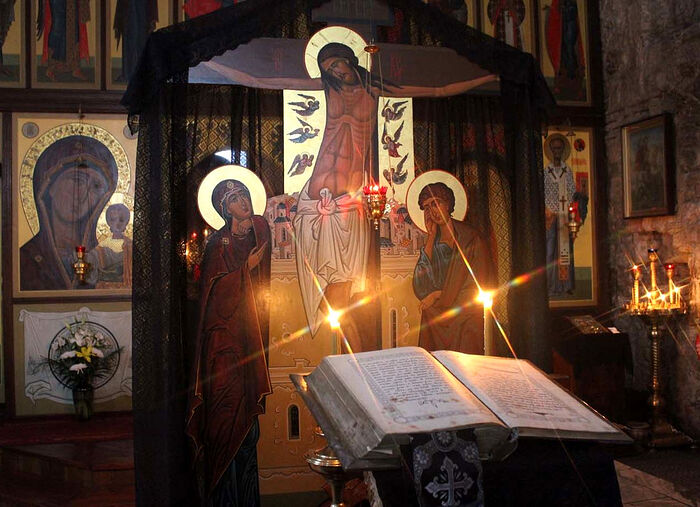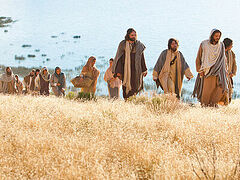“As the Lord went to His voluntary Passion, He said to His Apostles on the way: ‘Behold, we go up to Jerusalem, and the Son of Man shall be betrayed, as it is written of Him.’ Come, then, and let us also journey with Him, purified in mind; let us be crucified with Him and die for His sake to the pleasures of this life, that we may also live with Him” (Matins, Holy Monday evening, Praises, stichera 1)
With this morning, brethren, began the sacred week of the sufferings of Christ—the most important time in the entire year. Thus, each of these days has long been known as “Great and Holy.” And these days truly are great for the extraordinary events that took place in them; they are truly holy according to that special purity with which true Christians spend them, and which they can bring to anyone who spends these days as he ought. Therefore, the holy Church now, at the very beginning of these great and holy days, proclaims to us with a special appeal, inviting us to spend these days worthily. And that this call might be all the more real, it turns to us on behalf of the Lord Himself: “As the Lord went to His voluntary Passion, He said to His Apostles on the way,” and so on.
The Lord spoke about his path to the Apostles, but could not what He said to them be applicable to all who simply hear it? He aroused the attention of His first Disciples to His sufferings, but who among the most recent disciples doesn’t feel obliged to the same? We have celebrated all the important events in the earthly life of our Lord: His miraculous conception, His all-glorious birth, His wondrous presentation in the Temple, His even more wondrous Baptism, and yesterday’s entrance into Jerusalem. Cannot we also share His last minutes with Him?
We must especially show love and zeal now when everyone is abandoning Him! Is it not for us that He goes to the Cross? Is it not our sins that will be washed in His Blood? And will we allow ourselves to be absent at this time? No, brethren, come all, small and great, enlightened and simple, old and young. Come, let us unite in the spirit of faith and love, and let us follow our Savior with vigilant minds. Let not a single word of His go unheard; let us share in all His feelings, and let us enter into the spirit of all His actions. If people speak and act more strikingly before death, all the more does the God-Man. Thus, let us deepen our attention, and especially purify our thoughts. For as it’s impossible to see even the greatest and most distinct objects well with eyes full of dust, so is it impossible to contemplate the Divine majesty of the sufferings of Christ with a mind filled with impure thoughts about earthly goods.
But unfortunately for many, their thoughts and their whole soul are never so impure, so full of earthly vanities as in this holy and pure week. Worries about finishing various tasks before the feast, worries about preparing various things for the feast disperse the mind in all directions and scatter the senses amidst the vainest of things. That’s why some services, even the most important ones, such as the Royal Hours of Holy Friday, are sparsely attended; others aren’t attended at all. Much of what is read in Church, including the most important things, such as the stories of the four Evangelists about the life of Jesus Christ, go by without special attention, as something extraneous; and the image of the sufferings of Christ, inscribed by the Church in its rites with such wise detail and poignancy, can be contemplated in all its fullness only by the angels who are present in the churches of God.
Ah, my brethren! It’s not such thoughts, scattered and weighed down by earthly feelings, that Great and Holy Week demands of us! We will hear the story of the entire life of our Savior—for when is it more appropriate to go over the whole story than right before the end? But will someone who is so distracted, who doesn’t know his own life at all, be able to embrace this life in his thoughts? We will bear witness to the last conversations of the Lord with His Disciples at the Last Supper, but will our hearts be able to ignite with the fire of Jesus’ love if, like the heart of Judas, they are where their treasure is?
Thus, at least for our sakes, if not for the Lord’s sake, in these days we should gather, as far as possible, all of our thoughts and senses and purify them. Otherwise it’ll be impossible for us to follow after our Redeemer; otherwise we will depart from Him and will remain behind—some in Caiaphas’ court, with just an appearance of piety; some in Pilate’s praetorium, with only a guise of righteousness, with washed hands but a defiled conscience; some in Herod’s palace, with an apparently unintentional but nevertheless terrible mockery of the simplicity of faith; some with Judas, with obvious simony or despair. It’s not in vain that the Lord Himself said to the Apostles at the onset of His sufferings: He that hath a purse, let him take it, and likewise his scrip: and he that hath no sword, let him sell his garment, and buy one (Lk. 22:36). That means that we have to liberate ourselves from everything extraneous and distracting in these days. We need a sword—the determination to slay all our cares, every sinful and fleshly desire. Sell, O believing soul, sell now everything and buy this wonderful sword. You don’t need to strike Malchus with it, but that old man within you who often cries out against Christ: Away with Him, away with Him, crucify Him (Jn. 19:15).
“But where should we put all our daily cares?” some might ask. “A great and prolonged feast necessarily demands many cares about everyday things.” We know this situation, brethren, and we grieve that when Christ is on the Cross, Christians are at the market morning till evening; when Christ exclaims in agony: I thirst (Jn. 19:28), and is given vinegar, Christians are preparing a variety of foods and drinks; when Christ gives up His spirit to His Father, Christians barely catch their breath from their everyday vanities. All of this has become inevitable for many—but why? Who ordained that all our everyday needs should throng to these terrible days of the death and the burial of the Lord? By whose command do our flesh and blood then especially claim their rights over us and make us their slaves, as Christ is giving up His Flesh and Blood for us? Was it really not possible to satisfy most of these needs, if not all of them, in the preceding days, in order to devote this week, especially its final days, entirely to the Lord? Are there really not such people who act this way, for whom the carnal therefore doesn’t interfere with the spiritual? What prevents anyone from doing this, from paying their tribute to the world and the flesh in advance, so as to now be free for the spirit? “But the markets are empty then.” And who made them to be full on the most sacred days and the churches empty, if not our own dissipation and love for the world? The markets will follow the people once the people start going where they should.
But let us not, perhaps, demand a change in the everyday order of things, no matter how bad and unworthy of Christians it is; let us leave the dominance of the world in its place, even in these days. And at the same time, one can fulfill the requirements of the Church, have a purified mind and descend to Christ among His sufferings in the spirit of faith and love. The coming feast requires preparation, but how much? A good Christian will easily find a way to meet all the requirements of the feast without being distracted by thoughts and feelings, without losing sight of his Savior. The Apostles went to the city to make purchases, and they prepared the supper; and the equal-to-the-apostles women purchased spices; but look at how everything was so holy and pure with them! Why can’t it be the same with us? It’s only our vanity that fabricates a host of small, unnecessary needs, and torments us and others with their satisfaction; only the insatiability of our flesh increases through the measure of the demands of these bright days, which, being nourishing for the soul in and of themselves, for that very reason require less food for the flesh.
Thus, brethren, the coming feast requires little, because it contains much in and of itself: much spiritual food and drink, and many pleasures and much sweetness for the heart. If during the period of the feast, it seems the flesh requires too much, it’s because our spirit doesn’t enjoy the joys contained in the feast itself. It doesn’t enjoy it because it’s unable to taste spiritual goods; and it’s unable because it’s enslaved to the flesh—it has always hungered for sensual pleasures alone, neglecting the purification of its taste and other senses. That’s why after being present at church, often in body alone, we generally don’t know how to celebrate the feast except with a multitude of foods and the noise of amusements, which often end up obscuring the thoughts and all the senses.
Thus, we have the whole Kingdom of God with its great events, the whole faith with its holy Sacraments being best represented by the continuous service to the stomach—by meat and drink. Righteousness, and peace, and joy in the Holy Spirit (Rom. 14:17), the pure pleasures of the heart, the holy delights of the spirit, which constitute the main fruit of faith and the essence of every true feast are either not known to us at all, or are known in name alone. This condition is truly most lamentable! And here is the main reason for the transformation of the order of things and all the festivities, especially of the present great and holy days.
Being completely earthly ourselves, we make the feast of God more earthly as well. Being carnal, we make the very Cross of Christ a support for our flesh. But let us take the opposite path, and everything will take on a different, true, and correct form. Let us spend this week as we ought, let us fulfill the Church’s requirements, let us follow the Lord Who is going to His suffering, let us be crucified with Him to all the “sweetness of life,” and, without any great preparations for the flesh, we will find something we never found before in the coming feast: inexhaustible food for the spirit and joy for the heart. Enjoying the spiritual goods contained in the feasts will make us indifferent to the sensual goods connected with them. We will cease measuring the greatness of sacred days by the length of our meals and the variety of food; and along with this, a host of extraneous vanities, which steal precious time from us now, preventing us from following our Lord, will fall away from us by themselves. Thus, by itself, without trying, the correct order of things, days, and activities will be imperceptibly restored.
I repeat, brethren, let us make this holy experience ours; let us decide to give as much time as possible in these holy days to the Lord, and as little as possible to the world; let us decide to gather all our thoughts and senses and direct them in the wake of the Lord going to His suffering. These sacred days have already passed by for us many times without any benefit, or maybe even with spiritual harm; let us spend these days at least for once as we should. This usually seems boring to us, and that’s why we’re usually so adverse to it. But I, on behalf of the holy Church, one behalf of our Savior Himself Who is going to His suffering, dare to assure you that the proper conduct on these holy days contains such an inner sweetness that whoever spends them appropriately once will require no further impetus to spend them this way always.
Amen.




